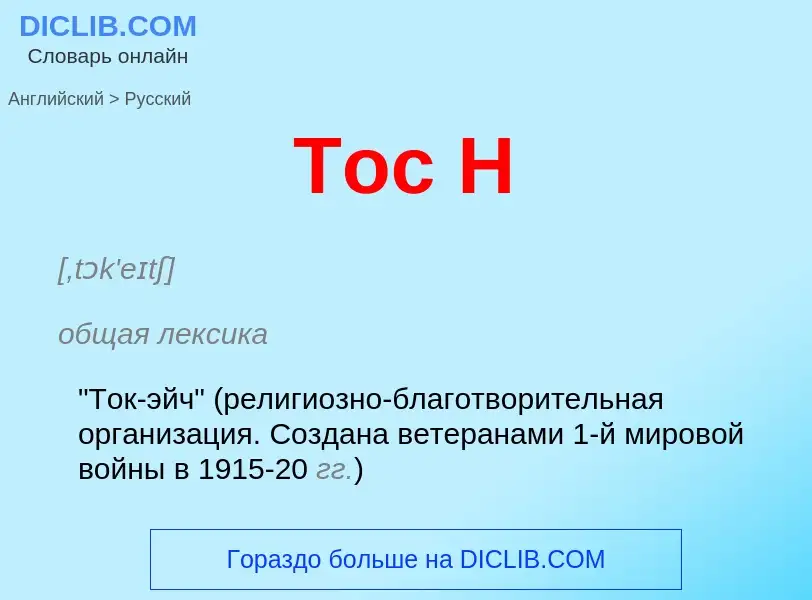ترجمة وتحليل الكلمات عن طريق الذكاء الاصطناعي ChatGPT
في هذه الصفحة يمكنك الحصول على تحليل مفصل لكلمة أو عبارة باستخدام أفضل تقنيات الذكاء الاصطناعي المتوفرة اليوم:
- كيف يتم استخدام الكلمة في اللغة
- تردد الكلمة
- ما إذا كانت الكلمة تستخدم في كثير من الأحيان في اللغة المنطوقة أو المكتوبة
- خيارات الترجمة إلى الروسية أو الإسبانية، على التوالي
- أمثلة على استخدام الكلمة (عدة عبارات مع الترجمة)
- أصل الكلمة
Toc H - ترجمة إلى إنجليزي
[,tɔk'eɪtʃ]
общая лексика
"Ток-эйч" (религиозно-благотворительная организация. Создана ветеранами 1-й мировой войны в 1915-20 гг.)
от Talbot House; Toc - старое название буквы "T" у связистов
синоним
общая лексика
Table Of Contents
оглавление, таблица содержания
каталог компакт-диска
сокращение
[top of cement] верхняя граница цементного кольца
[eitʃ]
общая лексика
(hour) час
высота
сокращение
height
Смотрите также
существительное
общая лексика
8-я буква английского алфавита
8-й номер серии
H (интенсивность магнитного поля)
(H) в грам. знач. прил. (также как компонент сложных слов) имеющий форму буквы H
H-образный
героин
физика
(H)
электротехника
генри
синоним
ويكيبيديا

Toc H (also TH) is an international Christian movement. The name is an abbreviation for Talbot House, "Toc" signifying the letter T in the signals spelling alphabet used by the British Army in World War I. A soldiers' rest and recreation centre named Talbot House was founded in December 1915 at Poperinghe, Belgium. It aimed to promote Christianity and was named in memory of Gilbert Talbot, son of Lavinia Talbot and Edward Talbot, then Bishop of Winchester, who had been killed at Hooge in July 1915. The founders were Gilbert's elder brother Neville Talbot, then a senior army chaplain, and the Reverend Philip Thomas Byard (Tubby) Clayton. Talbot House was styled as an "Every Man's Club", where all soldiers were welcome, regardless of rank. It was "an alternative for the 'debauched' recreational life of the town".
In 1920, Clayton founded a Christian youth centre in London, also called Toc H, which developed into an interdenominational association for Christian social service. The original building at Poperinghe has been maintained and redeveloped as a museum and tourist venue. Branches of Toc H were established in many countries around the world. An Australian branch was formed in Victoria in 1925 by the heretical Rev. Herbert Hayes. Another was formed in Adelaide the same year.
Toc H members seek to ease the burdens of others through acts of service. They also promote reconciliation and work to bring disparate sections of society together. Branches may organise localised activities such as hospital visits, entertainment for the residents of care homes and organising residential holidays for special groups.
The organisation suffered a progressive decline in membership and closure of branches during the later 20th century. In 2008, continued operation was ensured by dispensing with paid staff. In the 21st century, Toc H trustees have planned for it to become a stronger, voluntary movement still guided by the ethos of the original Talbot House.


